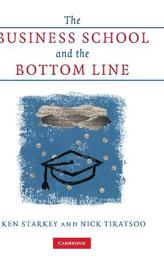
|
The Business School and the Bottom Line
Hardback
Main Details
| Title |
The Business School and the Bottom Line
|
| Authors and Contributors |
By (author) Ken Starkey
|
|
By (author) Nick Tiratsoo
|
| Physical Properties |
| Format:Hardback | | Pages:252 | | Dimensions(mm): Height 235,Width 160 |
|
| Category/Genre | Business and management |
|---|
| ISBN/Barcode |
9780521865111
|
| Classifications | Dewey:658 |
|---|
| Audience | | Professional & Vocational | |
|---|
| Illustrations |
5 Tables, unspecified
|
|
Publishing Details |
| Publisher |
Cambridge University Press
|
| Imprint |
Cambridge University Press
|
| Publication Date |
16 August 2007 |
| Publication Country |
United Kingdom
|
Description
In recent decades, business schools have become important components of higher education throughout the world. Yet, surprisingly, they have received little serious attention. This book provides a sober and evidence-based assessment, charting the history and character of business schools in the light of current debates about the role of universities and the evolution of advanced economies. Previous commentators have viewed business schools as falling between two stools: lacking in academic rigour yet simultaneously derided by the corporate world as broadly irrelevant. However, over-concern with criticism risks ignoring the benefits of reform. What business schools need is reconfiguration based on new relationships with academia and business. Such change would deliver institutions that are truly fit for purpose, allowing them to become key players in the 21st century's emergent knowledge societies. This timely critique should be read by academics and policy-makers concerned with the present state and future development of business education.
Author Biography
Ken Starkey is Professor of Management and Organisational Learning and Head of the Strategy Division at Nottingham University Business School. He is a former Chair of the British Academy of Management Research Committee and a fellow of the Sunningdale Institute of the National School of Government. He is the author of ten books, including How Organisations Learn (2004). Nick Tiratsoo is currently chair of a regeneration charity in East London. He was previously Visiting Research Fellow with the Business History Unit at the London School of Economics and Political Science, and Senior Research Fellow at Nottingham University Business School. He has published widely in the fields of political history, business history and planning history.
Reviews'Business schools play a key role in higher education and in the economic institutions that drive modern societies. Yet little systematic scholarship has been devoted to understanding and improving them. Starkey and Tiratsoo fill this gap admirably. They trace business schools' evolution globally; identify the diverse demands facing them today; describe their approaches to teaching and research; and provide reasonable prescriptions for their future success. This book is essential reading for all of us - administrators, faculty, students, and corporate leaders alike - who want (and need) business schools to thrive.' Thomas G. Cummings, Professor and Chair, Department of Management & Organization, Marshall School of Business, University of Southern California 'This is an important book. How academic institutions are managed so as to create strong, positive societal values is key - and this is what the book is all about. A must-read!' Peter Lorange, President IMD, The Nestle Professor 'This book provides critical and valuable insights into the understanding of the challenges Business Schools are facing in the current world a result of globalisation trends. This thoughtful and constructive analysis will contribute to improve their leadership and governance - a top priority in making positive impact not only in management education worldwide but also in society as a whole.' Fernando Fragueiro, Dean, IAE Business School, Austral University, Argentina 'Increasingly influential - and increasingly criticized - there is no better gathering of facts about what's going in business schools than this work from two experienced authors who have read, probed, and interviewed widely. Especially fine are their analyses of the changing relationship between town and gown; Chapter 6 is a jewel. Their no-holds-barred remarks about the weaknesses of today's business school strategies, and the possibilities for tomorrows', are simply the best available in this globalizing discussion.' J. C. Spender, Svenska Handelsbanke, Fulbright-Queen's Research Professor, Queen's University, Canada and Lund University School of Economics & Management, Sweden
|